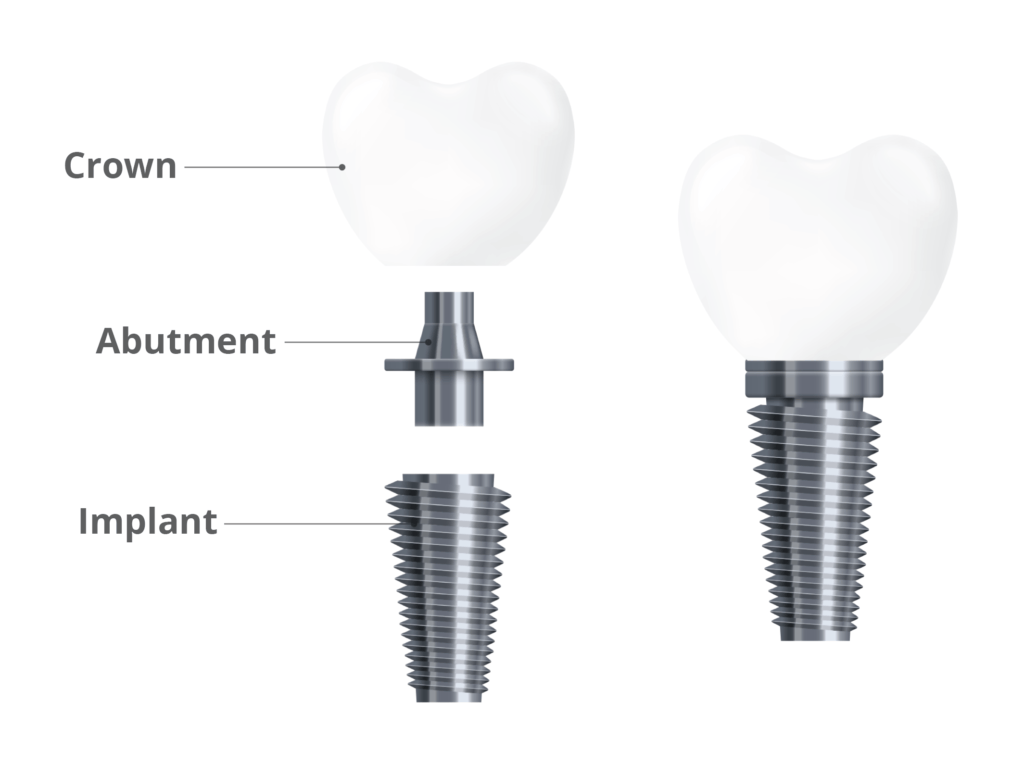Are you tired of hiding your smile due to missing teeth? Dental implants could be the solution you’ve been searching for. In this ultimate guide, we will walk you through everything you need to know about dental implants, from what they are to the benefits they can provide.
Understanding What Dental Implants Are
At the core of dental restoration, dental implants stand out as a revolutionary solution for replacing missing teeth. These sophisticated devices are essentially small, sturdy titanium posts that are surgically inserted into the jawbone where teeth are missing. Over time, these implants fuse with the bone through a process known as osseointegration, creating a strong and durable foundation for artificial teeth. This fusion not only ensures that the implants remain securely in place but also helps preserve the jawbone and maintain facial structure, preventing the bone deterioration that often accompanies tooth loss.
Unlike other tooth replacement options, dental implants do not rely on neighboring teeth for support. This independence is key to their success and popularity, as it means that adjacent healthy teeth do not need to be modified or subjected to additional strain. Each implant serves as a stand-alone unit, providing the basis for a variety of dental prosthetics, from individual crowns to full bridges and even complete dentures.
Single dental implants do NOT rely on neighboring teeth for support. However, with full smile restorations, all-on-four dental implants and all-on-six dental implants utilize a single implant to utilize support for for a set of adjacent crowns.
The top portion of a dental implant, known as the abutment, is designed to securely hold the replacement tooth or teeth. Whether the final restoration is a single crown, part of a bridge, or a full denture, the abutment ensures that the new teeth look, feel, and function just like natural teeth. This seamless integration not only enhances the aesthetic appearance of one’s smile but also restores full chewing functionality, allowing individuals to enjoy a wide range of foods without concern.

Key Parts of an Implant:
- Crown: The actual permanent “tooth” in your implant.
- Abutment: The part that connects your crown to your implant.
- Implant: The component that affixes to your jaw and the actual foundation of your new permanent tooth.
Dental implants represent a significant advancement in dental technology, offering a permanent solution to tooth loss that closely mimics natural teeth in both appearance and function. Through their innovative design and the unique process of osseointegration, they provide unparalleled stability and support for dental restorations, paving the way for improved oral health and overall quality of life.

Ready to See Your Future Smile? Complete the form below and we will send you instructions on how to get you free smile design:
Are You a Good Candidate for Dental Implants?
Determining if you are a suitable candidate for dental implants involves a comprehensive evaluation by your dental professional. The ideal candidate for this revolutionary tooth replacement option is someone in good general health and with sufficient jawbone density to support the implant. Good oral health is crucial, as conditions such as periodontal disease must be managed or resolved before proceeding with the implant process. Smokers, or those with chronic illnesses such as diabetes or heart disease, may face additional challenges and should discuss these openly with their dentist to understand how these conditions might affect the success of dental implants.
For those with different bone density situations, we utilize all-on-six implants on the top to minimize bone graft to minimize the possibility of failure and all-on-four implants on the bottom.
Another key factor is commitment to oral hygiene and regular dental visits post-implant. Successful implant candidates should be willing to maintain meticulous care routines and follow their dental professional’s guidance to ensure the longevity of their dental implants. For individuals lacking adequate bone density, there may be the possibility of undergoing bone grafting procedures to build up the necessary bone—a topic that should be discussed in detail with your dentist.
It’s also important to consider your motivation and expectations. Dental implants require a time investment, as the process spans several months from initial consultation to the final placement of the prosthetic tooth or teeth. Being prepared for this journey, understanding the steps involved, and having realistic expectations about the outcomes are essential components of being a good candidate for dental implants.
Ultimately, a detailed consultation with your dental professional will help determine if dental implants are the most suitable option for you, taking into account your health, dental history, and specific needs. This personalized approach ensures that you receive the most appropriate treatment to restore your smile effectively.
The Dental Implants Procedure Explained
Embarking on the journey to get dental implants begins with a thorough initial consultation, during which your dentist will assess your oral health, review your medical history, and discuss your goals for treatment. This step is crucial for crafting a personalized treatment plan tailored to your specific needs.
Following this, the actual implantation process gets underway with the surgical placement of the titanium implant into the jawbone, at the site of the missing tooth. This surgery is typically performed under local anesthesia, ensuring comfort throughout the procedure. After the implant is placed, a period of healing, known as osseointegration, commences. During this time, which can last several months, the implant gradually fuses with the jawbone, creating a solid foundation for the artificial tooth.
Once osseointegration is complete, an additional minor surgery might be needed to place the abutment, which will hold the dental prosthesis. In some cases, the abutment is installed concurrently with the implant. After the gums heal around the abutment, impressions of your mouth will be taken, which are used to create the crown, bridge, or denture that will be attached to the implant.
The final step is the placement of the prosthetic tooth or teeth. This phase of the process is highly rewarding, as you see your smile restored to its natural beauty and function. Each step is performed with precision and care, ensuring that your journey towards a restored smile is as smooth and effective as possible.
Through this detailed procedure, dental implants offer a durable and aesthetically pleasing solution to tooth loss, closely mimicking the look, feel, and function of natural teeth.
Types of Dental Implants
Dental implants have become a widely used option for tooth replacement, offering a durable and aesthetically pleasing solution. The types of dental implants primarily include Single Implants, All-On-Four, and All-On-Six systems, each tailored to different patient needs based on the condition of their jawbone, the number of missing teeth, and other factors. Here is a brief explanation of these types:
1. Single Dental Implants
Usage: Single implants are used for individual tooth replacement. This option is suitable when one or more teeth are missing but the surrounding teeth do not require replacement. Each implant consists of a titanium post (which serves as the tooth root), an abutment (which connects the post to the replacement tooth), and the prosthetic tooth (usually a crown) itself.
Advantages: This option preserves the health of adjacent teeth by preventing them from shifting and helps maintain jawbone health. The look and feel are very close to natural teeth, and the function is excellent, allowing for normal eating, speaking, and maintenance.
2. All-On-Four Dental Implants
Usage: The All-On-Four technique is generally used for full arch restoration, meaning it replaces all the teeth in either the upper or lower jaw (or both). This method requires the strategic placement of four dental implants in areas of the jawbone that retain sufficient bone density, even in patients who have experienced some bone loss. Once the implants are placed, a full dental prosthesis (bridge) is attached to these four posts.
Common Application: Although it can be used in both jaws, the All-On-Four method is most commonly used in the lower jaw due to its suitability in areas where bone density might be an issue.
Advantages: This method offers a fixed and stable solution for patients lacking teeth, with the benefit of needing fewer implants and often avoiding the need for bone grafting.
3. All-On-Six Dental Implants
Usage: Similar to the All-On-Four technique, the All-On-Six uses six implants instead of four, placed in the upper jaw, which typically has less bone density than the lower jaw. This method is also designed for full arch restoration and aims to provide a more robust foundation for the prosthetic teeth by distributing the force across six implants.
Common Application: It is primarily recommended for the upper jaw due to its ability to provide enhanced support where there might be significant bone loss or less bone density, ensuring a secure foundation for the prosthetic teeth.
Advantages: By using more implants, the All-On-Six method can increase support and stability for the dental prosthesis. This option may also increase the longevity of the implants and provide a better distribution of force across a larger area of the jaw, potentially improving both function and comfort for the patient.
Caring for Your Dental Implants
Maintaining your dental implants is crucial to ensure they last a lifetime and continue to function as intended. The key to this longevity is adopting a diligent oral hygiene routine. Brushing twice a day with a soft-bristled toothbrush and using a non-abrasive toothpaste are foundational practices. Equally important is flossing daily; special flosses designed for implants can help clean around the implants, under the artificial teeth, and along the gum line effectively.
Good hygiene, eating habits, and other steps will help you maximize the lifetime of your dental implants. Your dentist at Denovo will help you learn how to care for your implants after the procedure.
In addition to at-home care, scheduling regular dental check-ups and cleanings is vital. These visits allow your dental professional to monitor the health of your implants and the surrounding tissue, ensuring any potential issues are identified and addressed promptly. During these check-ups, your dentist or hygienist can also provide professional cleaning of your implants, which is essential for preventing plaque buildup and ensuring the health of your gums.
It’s also advisable to be mindful of habits that could jeopardize your implants. Avoiding hard and sticky foods can prevent undue stress on your implants, reducing the risk of damage. If you grind or clench your teeth, discuss this with your dentist. They may recommend wearing a nightguard to protect your implants and natural teeth from excessive wear.
Embracing these care practices not only contributes to the longevity of your dental implants but also supports your overall oral health. With the right care and attention, your dental implants can continue to provide you with a functional, beautiful smile for many years to come.
Understanding the Costs Involved
The investment in dental implants involves several factors that can influence the overall cost. One of the primary determinants is the number of implants you require. A single tooth replacement will naturally cost less than a full arch restoration. Additionally, the complexity of your specific dental situation, such as the need for bone grafting or the type of prosthetic teeth selected, can impact the price.
Dental implants are a long-term investment with a higher upfront cost, but over their lifetime, you will not need to replace them or have
Location also plays a significant role in determining the cost of dental implants. Prices can vary widely from one region to another, influenced by the cost of living and the availability of specialized dental professionals. It’s worth noting that while dental implants may present a higher upfront cost compared to other tooth replacement options, their durability and longevity can make them more cost-effective in the long run.
Before proceeding, it’s crucial to have a detailed discussion with your dentist about the anticipated costs. This conversation should include not only the price of the implant surgery itself but also any preparatory procedures, follow-up appointments, and the cost of the prosthetic teeth. Understanding the full scope of the financial commitment will help you make an informed decision.
Many dental offices offer financing plans or payment options to help manage the cost of dental implants. Additionally, some dental insurance plans may cover a portion of the cost, particularly if tooth loss is due to an accident or injury. Checking with your insurance provider to see what is covered under your plan is a prudent step.
By carefully considering these factors and exploring available financial options, patients can better prepare for the investment required for dental implants. Although the cost may seem daunting at first, the benefits of dental implants—a restored smile, improved oral health, and enhanced quality of life—can be invaluable.
Recovery and What to Expect
The period following your dental implant surgery is crucial for the success of your new smile. During this time, it’s normal to experience some degree of discomfort, swelling, and bruising around the implant site. These symptoms are part of the body’s natural healing process and should begin to subside within the first few days after the procedure. Your dentist will provide you with specific post-operative care instructions, which may include recommendations for over-the-counter pain relief, dietary modifications, and oral hygiene practices to aid in your recovery.
To ensure the best possible healing, it’s important to adhere strictly to these guidelines. You may be advised to eat soft foods and avoid hot beverages immediately following the surgery to prevent irritation of the implant site. Keeping the area clean is essential for preventing infection; however, be gentle when brushing and flossing around the implants to avoid disrupting the healing tissues.
Your dentist might also schedule follow-up visits to monitor the progress of your healing and address any concerns that arise. These appointments are a critical component of your recovery process, allowing your dental professional to ensure that the implant is integrating successfully with your jawbone and that your gums are healing properly.
While the recovery process may present some temporary challenges, following your dentist’s advice closely will help you navigate this period more comfortably. Remember, each step in the recovery phase brings you closer to unveiling your new, fully restored smile. Patience and diligent care during this time lay the foundation for the long-term success of your dental implants, contributing to a healthier mouth and a more confident you.
The Long-Term Benefits of Dental Implants
Dental implants stand out as a premier choice for those looking to address tooth loss, not only for their immediate aesthetic and functional benefits but also for their significant long-term advantages. One of the most notable benefits is the preservation of jawbone health. Unlike other tooth replacement options that may lead to bone deterioration over time, implants stimulate and maintain bone structure, thanks to their unique integration with the jawbone. This stimulation helps to prevent bone loss, ensuring that your facial structure remains supported and unchanged.
Additionally, implants boast an impressive durability. When cared for properly, with diligent oral hygiene and regular dental check-ups, they have the potential to serve you for the rest of your life. This longevity makes them a cost-effective solution in the long run, despite the initial investment. The freedom from the routine adjustments and replacements often associated with dentures or bridges further underscores their value.
The impact of dental implants on quality of life cannot be overstated. They restore not only the look of natural teeth but also full chewing functionality, allowing for a diet without restrictions. This ability to eat a wide variety of foods contributes to better overall health and well-being. Moreover, the security and stability provided by implants eliminate the worry of slipping or clicking noises associated with dentures, enhancing confidence in social and professional settings. See some of the results you can expect with dental implants below.
In sum, the long-term benefits of dental implants extend far beyond the cosmetic. They offer a permanent solution that promotes oral health, preserves natural facial contours, and enhances the quality of life, affirming their status as a superior choice for tooth replacement.
What Are the Benefits of Getting a Full-Mouth Restoration Where Everything Is Done In House?
Full-mouth reconstruction, often involving dental implants, can significantly improve not just the appearance of one’s smile but also the functionality of their teeth, enhancing overall quality of life. Choosing a reputable implant clinic like Denovo Smiles, where all the care professionals are in-house, offers a myriad of benefits:
- Comprehensive Evaluation and Personalized Care: At specialized clinics, the team takes the time to conduct thorough evaluations and create customized treatment plans that address both the aesthetic and functional needs of the patient. Because all the professionals are under one roof, they work closely together to ensure a cohesive approach to the patient’s dental health.
- Expertise and Experience: Implant clinics like Denovo Smiles focus specifically on implants and reconstructive dental procedures, meaning they have a high level of expertise and experience in this area. Patients benefit from professionals who are not only well-versed in the latest techniques but also have a wealth of experience with similar cases.
- Streamlined Communication and Collaboration: When all the necessary specialists are available in one clinic, it fosters seamless communication and collaboration among the dental team. This multidisciplinary approach ensures that every aspect of the treatment plan is well-coordinated, reducing the risk of misunderstandings or conflicting recommendations.
- Convenience: Having all specialists in one location eliminates the need for patients to travel to different clinics for various parts of the treatment, saving time and reducing hassle. This is particularly beneficial for full-mouth reconstructions, which typically require multiple appointments and different types of expertise.
- Advanced Technology: Specialized clinics often invest in the latest dental technologies to provide superior care, from precise imaging equipment to state-of-the-art dental materials. This investment in technology can lead to more accurate diagnostics, more efficient procedures, and better outcomes for patients.
- Continuity of Care: Undergoing the entire process in one clinic, from initial consultation through to surgery and follow-up, means patients develop a relationship with their dental team. This continuity of care ensures that the team is fully aware of the patient’s dental history, preferences, and concerns, allowing for adjustments in the treatment plan as necessary to achieve the best outcome.
- Predictable Results: Thanks to the specialized focus, coordinated approach, and use of advanced technology, clinics like Denovo Smiles can often provide more predictable and successful results. Patients can feel confident that they are in the hands of professionals who have a track record of successful full-mouth reconstructions.
Choosing the right clinic for a full-mouth reconstruction is a significant decision that impacts not only the aesthetics of one’s smile but also their overall well-being. Clinics like Denovo Smiles offer a comprehensive, expert, and patient-centered approach to dental care, making them an attractive choice for anyone considering dental implants or other forms of dental restoration.






